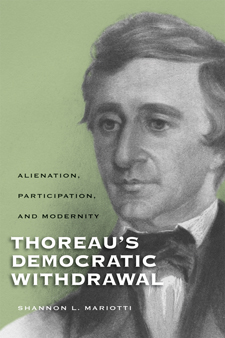|
Thoreau’s Democratic Withdrawal
Alienation, Participation, and Modernity
Shannon L. Mariotti
Studies in American Thought and Culture
“Mariotti’s crisp and engaging book will make you think again about who Thoreau is and what difference he makes to democratic theory. By means of the surprising but highly productive pairing of Thoreau with Adorno, Mariotti reveals the political value of withdrawing from the glare of publicity in order to recover the capacity to think and act against the grain.”—Jane Bennett, author of Vibrant Matter: A Political Ecology of Things
Best known for his two-year sojourn at Walden Pond in Massachusetts, Henry David Thoreau is often considered a recluse who emerged from solitude only occasionally to take a stand on the issues of his day. In Thoreau’s Democratic Withdrawal, Shannon L. Mariotti explores Thoreau’s nature writings to offer a new way of understanding the unique politics of the so-called hermit of Walden Pond. Drawing imaginatively from the twentieth-century German social theorist Theodor W. Adorno, she shows how withdrawal from the public sphere can paradoxically be a valuable part of democratic politics.
Separated by time, space, and context, Thoreau and Adorno share a common belief that critical inquiry is essential to democracy but threatened by modern society. While walking, huckleberrying, and picking wild apples, Thoreau tries to recover the capacities for independent perception and thought that are blunted by “Main Street,” conventional society, and the rapidly industrializing world that surrounded him. Adorno’s thoughts on particularity and the microscopic gaze he employs to work against the alienated experience of modernity help us better understand the value of Thoreau’s excursions into nature. Reading Thoreau with Adorno, we see how periodic withdrawals from public spaces are not necessarily apolitical or apathetic but can revitalize our capacity for the critical thought that truly
defines democracy.
In graceful, readable prose, Mariotti reintroduces us to a celebrated American thinker, offers new insights on Adorno, and highlights the striking common ground they share. Their provocative and challenging ideas, she shows, still hold lessons on how we can be responsible
citizens in a society that often discourages original, critical analysis of public issues.
"Shannon Mariotti joins the ranks of Stanley Cavell, George Kateb, and Jane Bennett with this remarkable rethinking of Thoreau. Her creative use of Adorno’s critical perspective, brought to bear on the conventional understanding of Thoreau’s supposed antisocial bias, allows us to think again about his vision, one that is not simply democratic, but tragically so.”—Thomas Dumm, author of Loneliness as a Way of Life
“Beautifully analyzes the implications of Thoreauvian withdrawal for modern politics and reminds us that the construction of the democratic city requires the cultivation of intellectually critical yet spiritually
self-trusting democratic souls.” —Jack Turner, University of Washington
Studies in American Thought and Culture
Paul S. Boyer, Series Editor
Shannon L. Mariotti is assistant professor of political science at Southwestern University, Texas.
Media & bookseller inquiries regarding review copies, events, and interviews can be directed to the publicity department at publicity@wwwtest.uwpress.wisc.edu or (608) 263-0734. (If you want to examine a book for possible course use, please see our Course Books page. If you want to examine a book for possible rights licensing, please see Rights & Permissions.) |
|

Available now
LC: 2009008143 PS
264 pp. 6 x 9
|
